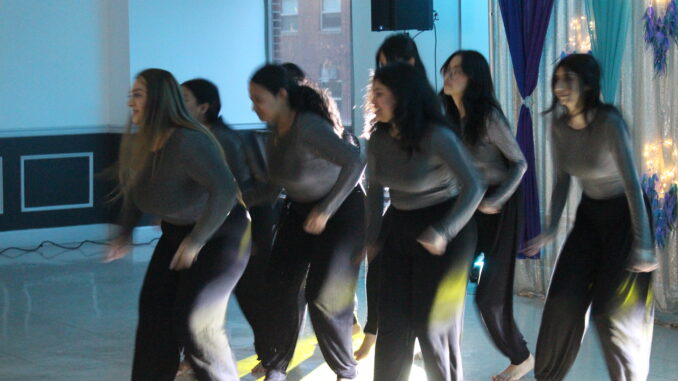
By Emmad Kashmiri
On Friday, May 10, Brooklyn College’s Desi Culture Club (DCC) hosted its annual Desi Night. The event aimed to celebrate South Asian culture and bring forth a sense of community, an inclusive event that saw a turnout of students from many different backgrounds.
“Desi” is a broad term that highlights the traditions of South Asian countries like Pakistan, India, Bangladesh, and Nepal, among many others. Alana Abraham, co-president of the Desi Culture Club, explained that although the diaspora is large, it is made up of individual cultures.
“Desi Culture is a loose term to describe the culture of the people of South Asia,” said Abraham. “Anyone willing to try our amazing food, dress in vibrant sarees and lehengas, and just have a good time is welcome to be part of our community.”
The audience was treated to a mix of traditional Desi performances, which included Bollywood dance routines and classical vocal performances, and each song showcased a different side of Desi culture.
“We had songs playing in Hindi, Punjabi, and Tamil, among other languages,” said Rishab Gera, co-president of DCC. “Desi night is a celebration of our diverse culture, bringing everyone together for a fun night.”
Joan Joseph, social media manager of DCC, highlighted that the goal of the event was to make sure it was inclusive for all BC students. “All the events we do aim to promote South Asian culture at Brooklyn College. Our events are open to all students, regardless of race or religious beliefs. We embrace the Desi community’s value of inclusivity and love for all,” she said.
DCC prides itself on creating a safe space for South Asian students to celebrate their heritage. For many, this sense of belonging is crucial, especially when they are far from their native countries.
“Desi Culture Club is crucial for students like me who leave home for college to celebrate their tradition and be proud of their heritage in a new and unfamiliar environment,” Joseph said. “It creates a safe space that many South Asian students in America don’t have outside their homes.”
Performers like Disha Prangon, who has participated in Desi Night for three years now, spoke about the importance of performing traditional dance for the whole community.
“Performing at the Desi Event allows me to express myself creatively and connect with my community in a meaningful way,” she said. “It’s incredibly fulfilling to be part of a tradition that celebrates our heritage and brings people together.”
Additionally, Desi Night was a means for students to enjoy the festivities as they head into finals season. “It’s a chance to relax, enjoy yourself with friends, and get reenergized before finals week becomes very intense,” said Prangon.
In addition to the main performances, the event featured a variety of traditional South Asian foods. Attendees could try butter chicken, gol gappe, samosas, naan. “Food is a big part of our culture, and sharing it with others is a way to bring people together,” said Gera.
The night also included an open dance floor, where students could dance to popular Desi music like “Chammak Challo,” “O Saki Saki,” and “Amplifier.” This segment of the event had everyone pumped up, as students of all backgrounds joined in dancing and celebrating together.
“Desi Night was about broadening the sense of community for South Asian individuals at Brooklyn College,” said Gera. “It gave people a night to connect with each other and celebrate their heritage.”
Brooklyn College became a vibrant hub of South Asian culture, leaving attendees with unforgettable memories, new friends, and a deeper appreciation for the traditions of the Desi community. Even though the Desi community still faces hardships across the globe, the community continues to be there for one another.
“The Desi community is pretty resilient. We’ve gone through a lot and still have brothers and sisters across the globe going through so much today,” said Abraham. “But we’ve remained resilient and a tight-knit community.”
